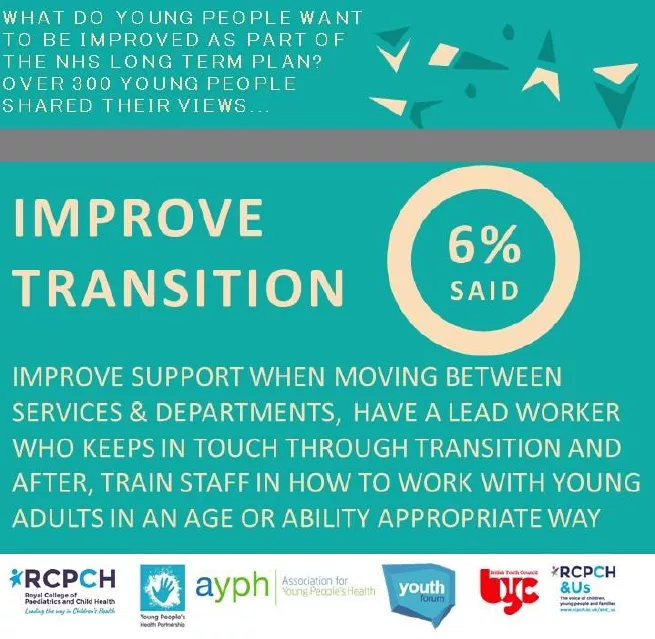What is a good transition process for young people?
When sharing their experiences on transition with RCPCH &Us, young people highlighted six key elements for creating a good transition process:
- Recognise and discuss individual needs in young people friendly terms
- Look at transition holistically, to include advice on: social, emotional, educational, geographical, employment, relationships and physical health
- Adult services to make social connections and have a long term relationship with young people, to provide continuity of care
- Multidisciplinary teams are important and should meet regularly to prepare the young person for transition
- Signpost to local services, resources and knowledge
- Support young people with their mental health
"Waking up on an adult ward for the first time was nothing short of scary"
Charlotte, a member of RCPCH &Us, presented at the RCPCH Conference in 2016 and shared her experience of transition.
Waking up after surgery on an adult ward for the first time was nothing short of scary. My parents couldn't stay with me and it felt worlds away from the safe haven of a children's ward. At an already stressful time the addition of moving to and navigating round adult services can feel all too much for many young patients. Often transition happens suddenly with little warning. The paediatrician who knew you so well is replaced by a GP who struggles in the short appointments to grasp the whole complex picture.
"The information should change when you get older"
We asked young people to let us know what works well for them and what their wishes are for the future. Here are some more of their experiences:
We need doctors who are aware of our whole life and experience, that know how to empower us to be able to speak up and who use different strategies to support our voice in clinic.
Having an appointment with my doctors [children's] with the one from the new hospital [adults'] helps and we can go on a visit before.
The information should change when you get older - at 16 I went with what I was being told. At 18 I understand more and what you do and why. Transition is when you go through all of this [in paediatrics] then you go straight to adults.
It is imperative for these young people to have a key named worker who is able to support us to access and negotiate the terrain of adolescent and adult services. The thresholds are different, the link up between services are different, we need someone to help us navigate this minefield. Secondly, it is imperative that everyone who may be involved in dealing with young people through the transition age have access to resources / central databank which allows for better signposting of services and support.
My wish is that I am trusted with more information.
What's in the Long Term Plan for the NHS? More views from young people
During the development of NHS England's Long Term Plan, we asked over 300 children and young people to share their hopes for the next ten years. Over 6% of young people highlighted transition as an important area to be included within the Long Term Plan.
Here are some of the young people's views:
I've been in my service for 15 years. I was talked about transition when I was 12 and it made me really wary. I transitioned at 15 and then I could accept it was happening.
I don't feel like I had enough information about my options, I went with what the professionals tell me.
Someone who was two years older told me about transitioning. I'd been introduced to another patient so that when I went to clinic I saw a familiar face and could ask questions.
Forms of support like a key worker for each person so you can continue to be supported through transitions / waiting times.
Other resources - young people share their views
Health Talk - videos of young people outline their experiences of using both child and adult clinics, and they offer advice on how professionals should treat adolescents.
NICE - in this video Thines Ganeshamoorthy, a service user who helped develop NICE guidance, shares his experience of transition between child and adult services.
National Children's Bureau - Jack and Tina share their experiences of transition and examine what data tells us about the needs of young people with long term health conditions.
British Heart Foundation - this film has been designed to help young heart patients through the transition process.
10 Steps Programme - Hannah shares her story and discusses the 'wrong way' to discuss transition.
NCEPOD - NCEPOD's report Each and Every Need provides a view of children and young people living with neurodisability. This video shares Christopher Myer's experiences.
Great Ormond Street Hospital for Children - three young people share their experience of planning for transition.
Barts Health - this video provides guidance for parents and young people going through the transition process.
Academi Wales - Beth's story of Down's Syndrome, narrated by her mother.
Roald Dahl's Marvellous Children's Charity - as part of the 'Everyone's Business Campaign', the charity have created short films showing the different experiences of transition from Roald Dahl Nurses, young people and parents.
NHS Youth Forum created a poster and film to promote the benefits of young people accessing peer support. The poster can be downloaded and displayed in healthcare settings to raise awareness for young people.
Children, young people and families are at the heart of our work, helping us shape policy and practice. Sign up to get involved










